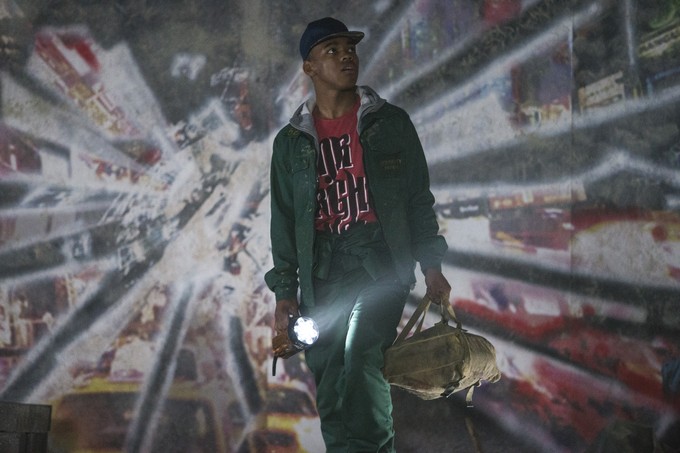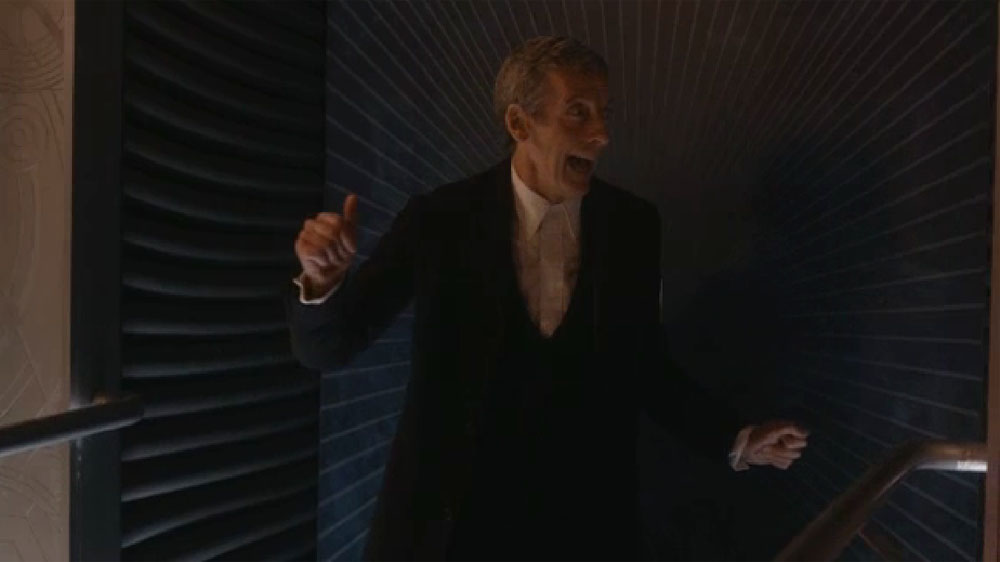STORY 254: IN THE FOREST
OF THE NIGHT
It was probably inevitable that after two brilliant Doctor Who episodes, there'd be a bit of a downturn. However, even I, having encountered all sorts of negative reviews for In the Forest of the Night and even a tepid review from The Nerdist (which is their version of a negative review), was not prepared for the absolute disaster that awaited me. Not since Love & Monsters have I been so naked appalled at what I saw, at a Doctor Who episode so hideously awful that it makes something like The Twin Dilemma look like Tomb of the Cybermen. From beginning to end, the episode was hideous, and In the Forest of the Night will earn a place in history as perhaps the Worst Doctor Who Episode of All Time, something that this generally bad season simply cannot afford. Even though showrunner Steven Moffat didn't write it, his fingerprints are all over it, as if credited screenwriter Frank Cottrell Boyce was given a template and told to string them together.
The Doctor (Peter Capaldi) opens the TARDIS to find two strange sights: an overgrowth of forest, and Maebh (Abigail Eames), a little girl who tells him either "Miss Oswald" or "voices" told her to find the Doctor. The Doctor cannot believe he has landed in the middle of London, but both the TARDIS and Maebh tell him he has, and seeing the new forest overrun Trafalgar Square is proof. Meanwhile, both Clara Oswald (Jenna Coleman) and Danny Pink (Samuel Anderson) are getting the kids in their care from their field trip, which was a sleepover at the London Zoological Museum.
I digress to wonder how times have changed. When I was in school, our field trips were a.) during the day, b.) a few hours long, and c.) never involved sleepovers, and certainly not at museums.
Well, as Danny keeps getting his 'team' together to get them home or Coal Hill School, they too are astonished to find a forest, the adults more than the kids, who like all television kids, are not impressed by anything. Eventually, they come to Maebh and the Doctor because Maebh is part of the field trip, a student they failed to notice was missing for a while.
They face the mystery of how this forest came about, with Maebh insisting they communicated with each other to grow spontaneously. Maebh's mother, despite some warning about staying indoors she obviously didn't hear, begins looking for her other daughter (since one daughter, Annabelle, disappeared a few months back). Well, Maebh's been on meds to stop hearing 'the voices' but the Doctor insists Maebh doesn't have mental health issues. Instead, she can hear the trees, or tree fairies, or whatever those things were.
 |
| We're with Stupid |
Well, they chase off a tiger with a flashlight, and the Doctor shows that a giant solar flare is coming Earth's way, which will destroy the planet. Clara wants to save the children, but then has a change of heart, not wanting to be the last of her kind. She urges the Doctor to leave them on Earth, to die.
Teacher of the Year material there, letting the Gifted and Talented group be vaporized.
Well, as it stands, we find that the spontaneous forest is not the enemy. The Trees Are Our Friends, having sprouted to absorb the solar flare, and once the storm passes it disappears, leaving everything as they found it. We even see that Maebh gets a gift...her sister Annabelle, who has suddenly emerged from bushes.
It's a curious thing about Doctor Who. No matter how often showrunner Steven Moffat flat-out lies to us (mistaking deliberate deception for 'misdirection'), his fans who hold him as some sort of genius believe him. He stated that this season would not be a 'fairy tale' one, and yet with In the Forest of the Night he's given us a fairy tale...complete with fairies! Granted, those little twinkling lights flowing about Maebh weren't BILLED as fairies, but they might just as well be given how ITFOTN used them.
The fairies as it were, are the least of the episode's problems. From the moment we begin, where Maebh is wandering the streets of London alone (which gives us THREE problems already: Clara and Danny's cluelessness about a child in their care missing, how Maebh was able to leave a building without setting off the alarm AND how she got out considering the doors were blocked by large pieces of wood that took the combined strength of Danny and the students to push open), ITFOTN was dead-set on making things as horrible and stupid for everyone concerned.
Let's start with the kids, who are supposed to be the Gifted and Talented group. Given how they didn't seem to understand anything other than selfies, if THEY were the G&T group Britain is about to be destroyed from within due to the population's basic stupidity. It's a trope of television to have back-talking, sarcastic, annoying know-it-all kids, but my experience with children reflects a different manner regarding children.
Most children I know are quite respectful of authority figures, are genuinely frightened of scary things, and generally work well together. Children in real life would be scared to not know where their parents were (and while a line at virtually the very end suggested they actually MIGHT miss their parents, how these kids had time for selfies but no time to bother calling home again makes me wonder how they could be the G&T kids). Oh, I forget: Clara told the Doctor that the whole "Gifted and Talented" thing was just a thing they told them. In other words, they really WEREN'T G&T, just a bunch of idiots who were gullible enough to believe that.
For a child-centered story like ITFOTN, it's interesting that the children were unnecessary to the story itself. Moreover, the situations they faced were quite horrifying. Danny frightening the tiger with a flashlight (or torch)? I would have thought the tiger would have grown enraged by the light, not run off by it. With Maebh being chased by wolves, I was astonished the Doctor and Clara never suggested she climb up any of those trees to get away from them.
As a side note, the whole 'Hansel and Gretel' thing was again more stupidity.
It isn't as if I don't know what ITFOTN was going for: a children's fairy tale in Doctor Who. However, why oh why do they have to be so OVERT about it?
On a more serious note, the whole 'don't medicate a child who hears voices' thing bothered me greatly. Is Doctor Who encouraging people to not take medication for mental health issues? This isn't the first time Doctor Who has played fast-and-loose with character's mental problems. I don't know how much criticism the show has received about this, but to dismiss hearing voices as actually a positive, particularly on an episode aimed squarely at children, is to me shocking and irresponsible.
As a side note, we're told that Maebh flapping her arms is a tic that results from the voices. I guess that means the Eleventh Doctor was hearing voices all the time then.
Nothing in this episode made sense. The Doctor declared the spontaneous forest 'a natural event'. Just as natural as the Moon being an Egg, I imagine. Clara tells the Doctor the sonic screwdriver is not a magic wand. Really? That's what its been for eight seasons, why stop now? The children coming up with a phone call that will contact EVERYONE on Earth. Guess those without a mobile/cell phone are just out of luck...as well as those who don't speak English (OK, maybe the TARDIS will translate the message in other languages). However, again the kids don't have to bother calling THEIR parents, parents who obey the government instruction to stay home...unless they don't happen to hear it like Maebh's mom, too busy arguing with someone on the phone to have either the television or radio on and whose friend obviously didn't either hear the message or look out the window to see a giant forest outside his/her own door.
Boy was this stupid.
I'll give credit in that yes, one shot was particularly beautiful (although obviously shot in a way that drew attention with itself). I give credit to Capaldi, who did his best under the simply bonkers situation he was forced into. "You need an appointment to see The Doctor," he tells Maebh when she first comes knocking at his door. Later on, when disagreeing with Maebh about how the trees can talk to each other, he asks how they did it. "Group message on Tree Facebook?" he comments. At least if nothing else, Capaldi can't be blamed for the horror In the Forest of the Night was.
Just an observation. Given how hot and heavy Danny and Clara are for each other, you think they did a little bump and grind next to the saber-tooth tigers at the museum? At least she can get pregnant THAT way, given, well, that's in the future...
In the Forest of the Night was reminiscent of another child-centered episode where the girl (who gave a bad performance) was able to communicate with otherworldly figures, right down to drawing what she knew. It's never a good thing when a Doctor Who episode reminds you of Fear Her. However, I found Fear Her more tolerable than this barbarity. I never thought I'd see something more loathsome than that, something I absolutely detested, something to rival Love & Monsters.
Never Say Never Again...
0/10
Next Episode: Dark Water/Death in Heaven








